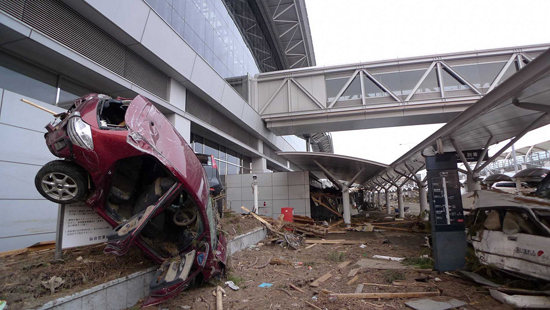Recalling Japan’s Tsunami, One Year Later
CAS prof’s memoir aids relief effort

Michael Mendillo’s memoir recounts his days stranded at Japan’s quake-and tsunami-stricken Sendai airport, pictured above. Photo by Flickr contributor Roberto De Vido
“The wall of water was thirty feet high.” So begins Michael Mendillo’s new memoir, An Earthquake, a Tsunami and a Meaningful Life. The book is both remembrance and repayment: remembrance of the titular disasters that crippled Japan one year ago Sunday, and repayment for the kindness shown Mendillo, the lone American stranded at the city of Sendai’s airport. (Proceeds from his book, which is self-published and available from Amazon.com will go to the American Red Cross Japanese relief.)
The College of Arts & Sciences astronomy professor had been in Japan for a conference and was trying to flee the country after warning tremors began. He didn’t make it. The quake, the worst in Japan’s recorded history, struck before his plane could take off, followed by a tsunami that he watched from the terminal’s third floor as the ocean flooded the ground floor. By the time he was able to fly home four days later, he’d dodged falling debris in the terminal, slept there in frigid temperatures, and skirted Japan’s stricken nuclear plants while being driven to safety.
Mendillo (GRS’68,’71) wrote his memoir with the aid of a diary that he’d kept during the disaster. He talked with BU Today about the memoir, which includes one happy ending, unknown to Mendillo when he described his ordeal to us a year ago, involving the coastal village where he’d been entertained during the conference.
BU Today: How many copies of your book have been printed and sold?
Mendillo: We’re only in the range of 100 or 200 that have been sold. Amazon prints them on demand. I bought 50 copies that I have given to a few people. And people have actually said, “I’ll give you money for that; I don’t want it free.” So then I send the money off to the Red Cross. It hasn’t made beyond about $500.
You wrote the book to help the relief efforts, but did you also find the writing therapeutic in dealing with the trauma?
Within a week of being back, I was invited to give two talks on the topic, one a conference on immediate responders at the College of Communication, about the Haiti earthquake. A few people there said, “You ought to write this up.” Then I was asked by the Japan Society of Boston to give a slideshow and talk. Again, people said, “You ought to write this up.” And then, a lot of professional colleagues from around the country or world would say, “I heard you were in this thing. Do you have any written recollections?”
But I wasn’t going to do it until I read in an airplane magazine that Amazon.com had already published one, with the proceeds going to the Red Cross. It was in April, probably my first flight after the earthquake. I thought, people have been asking me to do it, and now I have a reason that isn’t sort of ego.
I wasn’t feeling particularly down or a need to reconcile my own life with what had happened. I thought about it, and I still think about it. I wasn’t going to go to any more seismically active countries for a while, but the same week this year, I’ll be in Peru at an international meeting.
That suggests that perhaps you are over your fear of encountering a similar situation?
I agree. You face a situation and you say, gee, I could have died there very easily. I was never really scared about the tsunami, but the earthquake terrified me. You could die walking across Comm Ave and being hit by a bus if you’re not looking. But it has a certain impact when it’s a magnitude 9 earthquake and the whole building is going up and down. I’m a changed man in some sense. I certainly pay attention to what’s important in life—people, relationships, and spending time with family. You remind yourself a little more frequently to try not to get as upset about things as you might have. I don’t know if colleagues have found that I’ve mellowed at all. Probably no. But in my soul, I’ve mellowed a little bit. And I like it.
How long did it take you to write the book, and was it difficult?
I wrote most of it on the flight coming home. I was so charged. I had this 13-hour flight ahead of me, and I had this notebook. I just started transferring material to my laptop. I could not fall asleep.
You were haunted by the thought that the tsunami may have killed the people in the fishing village whom you spent your last night with.
When I sent a draft of this to my colleague in Japan, he corrected that. The book now says that all these magnificent, beautiful rocks that were in this harbor so disrupted the tsunami that the loss of life there was actually less. They had been saved by their village’s own natural beauty.

Comments & Discussion
Boston University moderates comments to facilitate an informed, substantive, civil conversation. Abusive, profane, self-promotional, misleading, incoherent or off-topic comments will be rejected. Moderators are staffed during regular business hours (EST) and can only accept comments written in English. Statistics or facts must include a citation or a link to the citation.